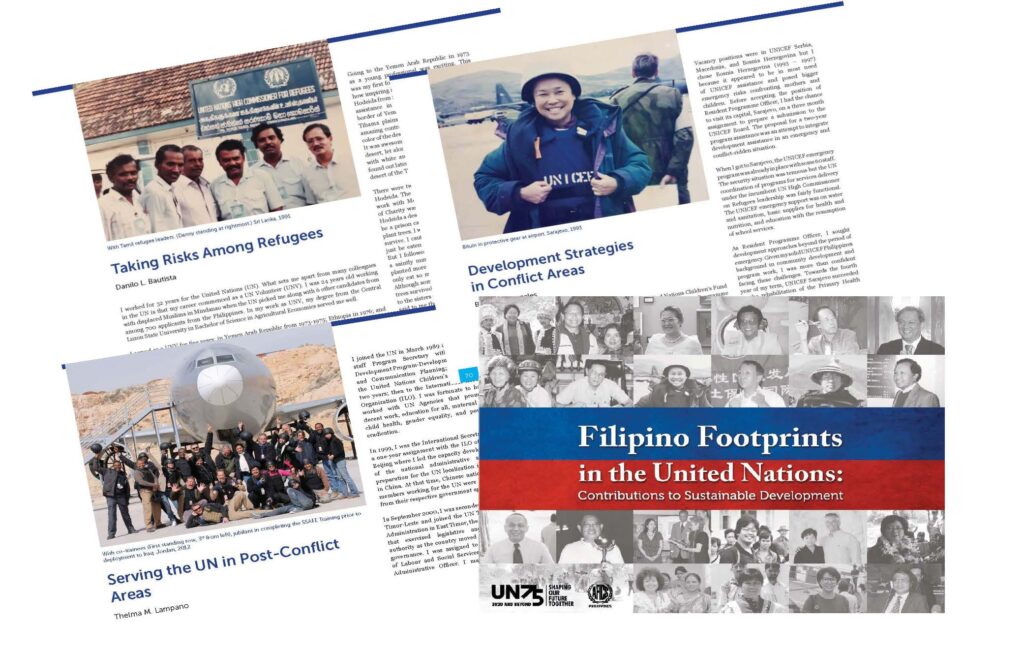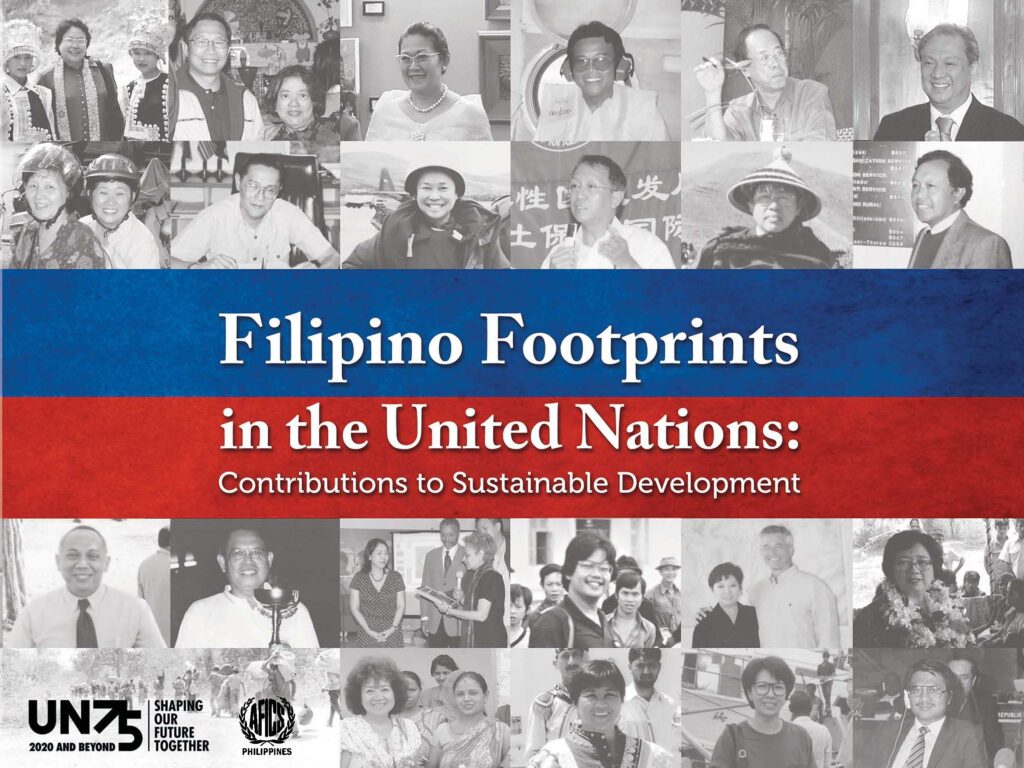How big of an impact has the Philippines, a developing country, left and continues to leave on a world body such as the United Nations (UN), which marks its 75th year in 2020?
Filipino Footprints on the United Nations: Contributions to Sustainable Development, a recently launched hardbound book, tries to answer this question and more through the eyes of several accomplished, dedicated and intrepid Filipinos who had answered UN’s call to serve.
“This book features stories of 46 Filipinos who gave their best to the United Nations and made a difference among the peoples they served,” said Cecilio Adorna, the book’s project director.
Their narratives and images taken during their respective tours of duty reveal the richness of the retirees’ experiences as they coped with challenges and navigated opportunities that allowed them to follow their dreams and fulfill their professional goals, Adorna added.

The book, a collective product of its editorial board led by Mary Ann Maglipon and Delia Barcelona, the project’s chief editor and associate editor, respectively, was launched virtually last Friday, October 23, in time for the UN’s 75th anniversary.
“Underlying each of our stories is a tribute to our roots—the Philippine institutions, communities and families that nurtured our formative years. From them, we drew strength and inspiration to go through our diverse journeys of service to humanity,” said Association of Foreign International Civil Servants (AFICS)-Philippines president Edmundo Ortega during the book launch.
A sampling of the experiences highlighted in the book shows the diversity of the retirees’ experiences in the UN system.
Danny A. Carlos says, “From my 16 years with peacekeeping assignments, I was exposed to great security risks and threats including crossing the green line in Beirut along charred and dilapidated buildings, seeking safety by ducking into bunkers or bomb shelters during heavy artillery…”
During his time in Mongolia, Richard P. Prado was dubbed the “King of Winter Field,” as his travels took him to many parts of the country under forbidding temperatures. In one travel, he says, “I suffered second degree burns when I took a shower after continuous exposure to the cold.”
On a lighter note, Jana P. Ricasio considers “occasionally seeing celebrity ambassadors of goodwill, the who’s who in the global intellectual community, and prominent world leaders” as highlights of serving at the UN Headquarters in New York.
For her part, Marylina C. Mabida writes, “I remember looking at the mountains, and could not help but be reminded of the Sound of Music, especially during winter when the mountains were covered with snow. It was beautiful. It was there that I first touched snow and played with snowballs like a child.”
Collectively these retirees have seen almost the entire world – having served in over 270 plus duty stations, posts and assignments, sometimes in the remotest and most dangerous parts of the countries they were assigned in. These travels have provided a “ rare opportunity to meet people from various cultures,” as Brenda S. Vigo writes.
Alcestis A. Mangahas asserts, “ Filipinos have become global citizens. Foreign travel and employment had strengthened not only our personal interactions with much of the world, but also reinforced our solidarity with many peoples through our shared experiences and our humanness.”
Working in the UN is not a piece of cake, as Ruth V. Batten, based on her own experience, shares: “My advice to the next generation of Filipinos in the UN—hard work pays dividends, share what you know. If people around you don’t show appreciation, know that someone benefits from it. Integrity is paramount in our work with the United Nations.”
Apart from life vignettes, each retiree offers a blurb that gives readers a glimpse of what he or she is up to after retirement, their philosophies and lifelong commitments, even their respective hobbies and leisure activities. Some still have duties to perform as mentors, consultants, advisors, or doting grandparents.

The book ends with the story of AFICS-Philippines, which was established 11 years ago. Also accredited by the Federation of all AFICS in other countries, AFICS-Philippines supports and assists former UN staff and, as needed, their dependents, and those about to leave the service about their rights and entitlements after serving the UN.
As the UN celebrates its 75th, year, the book bears witness to all who have served the global body. It is fittingly dedicated to those who have sacrificed and lost their lives while serving humanity; the countless unrecognized staff and personnel around the world; and all future generations who may be inspired by these Filipinos’ stories to join the ranks and continue striving for a better world.
For inquiries, email aficsphl.info@gmail.com





